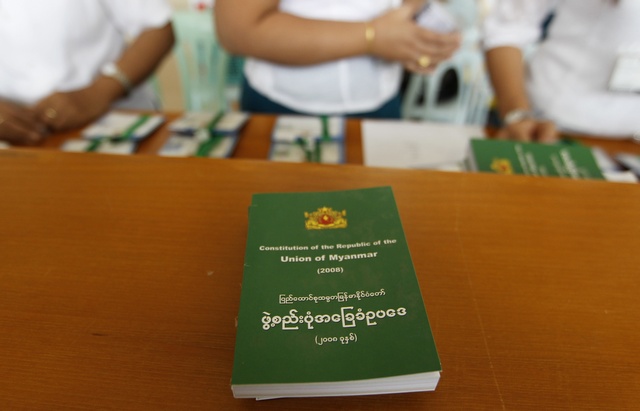Aung San Suu Kyi and the National League for Democracy (NLD) must play a leading role in repealing the authoritarian 1982 citizenship law that rendered the Rohingya stateless in Burma, a group of human rights organisations urged on Monday.
“The 1982 citizenship law should be repealed, and replaced with a new law founded on basic principles of human rights,” 31 leading INGOs said in a statement. “The new law should honour equality and non-discrimination, and help create an inclusive and tolerant Burma.”
The democracy icon took her seat in Parliament this week for the first time since returning from a historic trip to Europe, where she was repeatedly pressed on the issue of Rohingya citizenship and admitted that she “does not know” whether the minority can be considered Burmese.
Campaigners hope that the democracy icon can help resolve the controversy, which has divided the country after deadly sectarian riots pitted Arakanese Buddhists against Rohingya Muslims in Arakan state last month.
“The NLD have said that there needs to be clarity regarding citizenship laws,” Mark Farmaner, Director of Burma Campaign UK (BCUK) told DVB. “Now that NLD MPs are in Parliament we hope that they will act on this and make repealing the 1982 citizenship law one of their top priorities.”
Speaking in Norway after receiving her Nobel peace prize awarded in 1992 for her struggle against the military junta, Suu Kyi called for “rule of law” in western Burma, where more than 90,000 people have been uprooted by the ongoing violence.
“If we were very clear as to who are the citizens of the country, under citizenship laws, then there wouldn’t be the problem that is always coming up, that there are accusations that some people do not belong in Bangladesh, or some people do not belong in Burma,” she said.
But a spokesperson for the NLD told DVB that it was up to the national parliament to decide whether the citizenship law should be repealed and they could not comment further.
The 1982 law, enacted by former military ruler Ne Win, recognises the 135 national races in Burma but specifically excludes the Rohingya. It replaced the 1948 citizenship act, which stipulates that any person who has resided in Burma for more than two generations is entitled to citizenship.
The legislation has been widely condemned as incompatible with international human rights standards, including the right to a nationality. Amnesty International has previously slated the law for its “over-burdensome requirements for citizenship” and its “discriminatory effects on racial or ethnic minorities particularly the Rakhine [Arakanese] Muslims.”
Currently considered “illegal Bengali immigrants” by the government, the Rohingya are denied basic civic rights, such as access to health and education.
“My grandfather was a Burmese parliamentary secretary, how can I not qualify for citizenship?” asked Tun Khin, President of the Burmese Rohingya Organisation UK (BROUK) and a stateless refugee living in London, during an interview with DVB.
Burma’s pro-democracy movement has come under scrutiny for failing to speak out for the Rohingya in a display that has been branded “racist” and “hypocritical” by many analysts. Aung San Suu Kyi has also been criticised for framing the debate as an “immigration issue” in interviews.
“Aung San Suu Kyi is a Nobel peace prize laureate. She should be speaking out for human rights,” said Tun Khin. “Why is she talking about immigration?”
“She has herself said that the best time in Burma’s history was its democratic period [1948-1962] and during this time, the Rohingya were considered citizens.”
Last week, the Organisation of Islamic Cooperation (OIC) threw their voice behind calls for Suu Kyi to help quell the violence, which has already taken about 100 lives and risks unraveling Burma’s fragile democratic reforms.
The controversy surrounding citizenship may surface during the current session of parliament after the Rakhine Nationalities Development Party (RNDP) published a statement in late June calling for the segregation of Rohingya Muslims from ethnic Arakanese and urged the international community and UN to “set up a time frame to resettle to the Bengalis who are not Burmese citizens to a third country.”



